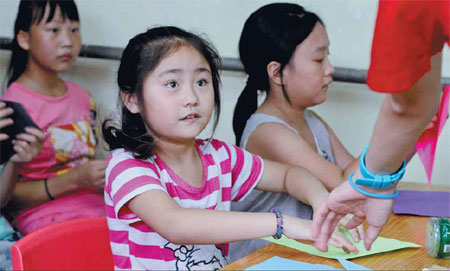Rural kids face boredom, safety risks in cities
Updated: 2013-08-22 07:40
By He Dan (China Daily)
|
||||||||

|
Migrant children play paper-folding games at the Mulan Activity Center in the Changping district of Beijing on Aug 7. The center has a library and organizes games. Xu Huiyan / for China Daily |
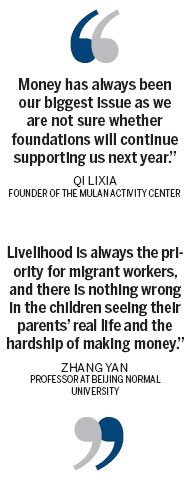
Organizations attempt to fill the spare time with daily activities, sports for young visitors
Zhang Xinlin's excitement about spending the summer with his parents in Beijing quickly disappeared when he realized he and his elder sister could not go anywhere, and had to settle for playing cards inside the family's rented apartment every day.
The siblings arrived in Dongshagezhuang, a large community dominated by migrant workers on the outskirts of Beijing, in early July.
"We're not allowed to go out to play because our parents worry about there being bad people on the streets," the 7-year-old said.
Zhang is from a village in Huanggang, Hubei province, and for most of his life has been in the care of his grandfather.
"It's so boring here," said Ni Junhao, 10, who was visiting his electrician father in the community, his third consecutive summer in Beijing. He complained that, despite being in the capital for more than 40 days, he had spent only one with his father, when they went to ride bumper cars in Chaoyang Park. He will return home to his village in Nantong, Jiangsu province, in mid-August.
Nearby, Hu Tian and her sister said their only pastimes are homework and watching their mother play mahjong.
Stories of boredom are common among rural children spending their summer vacations with parents in cities nationwide. One organization that attempts to relieve the boredom for migrant children in Dongshagezhuang is the Mulan Activity Center.
"Most migrant workers rent rooms of 10 to 20 square meters, where they eat and sleep, but children are vivacious and energetic, so it's really painful for them to live in such cramped conditions," founder Qi Lixia said.
Located in a traditional courtyard home, and with room for a maximum of 40 children, Mulan Activity Center is open from 8 am to 8 pm six days a week. Children can read books, play chess and darts, enjoy sports facilities and surf the Internet.
Most facilities are secondhand, donated by charitable foundations or individuals.
"Children can also play badminton in the alley outside," Qi said. "They love playing ping-pong, but we can't afford a table.
"Money has always been our biggest issue as we are not sure whether foundations will continue supporting us next year, and so far we have never received funds from the government for this project," she said.
Sometimes volunteers from universities teach the children handicrafts, environmental protection and personal safety skills in case of fires and earthquakes.
Although demand is huge, Qi estimated that less than 10 NGOs in Beijing provide services like those offered by her organization.
There are no reliable statistics to show how many rural children go to cities during the summer school holiday, which lasts about two months.
A report by the All-China Women's Federation in May said there are almost 100 million minors whose parents are migrant workers. Of these, 61 million are "left-behind children", which means they are growing up in villages without their parents.
Safety concerns
"During summer, most migrant workers' children are left at home unsupervised, so safety is a big issue," said Sun Heng, director of the Migrant Workers' Home in Beijing, an NGO dedicated to improving the rights of the migrant population.
"There are a lot of demolition and construction sites in these communities. Imagine their children running around; the chances of them getting hurt are worryingly high."
He said the media often reports on children being drowned or hit by cars, and said they are also vulnerable to child traffickers and sexual predators.
On Aug 8, a 13-year-old girl was left alone in her parents' dorm in Taiyuan, the capital of Shanxi province, and was sexually assaulted by a migrant worker who lived in the community, according to the Shanxi Evening News.
China National Radio also reported on July 15 that a court in Ningbo, Zhejiang province, had found migrant workers' children account for 70 percent of all juvenile victims in sexual harassment cases.
Children are not only victims of crime, but also sometimes become involved in criminal activities themselves, partly due to the lack of parental guidance.
Yang Chang, a judge in Beijing's Mentougou district, said summer is a peak time for crimes committed by minors, especially migrant workers' children, with intentional injury and public disorder the most common offenses. Most defendants are aged 12 to 14.
"Young offenders and victims have more time to go out independently, and their parents can't watch them at all times," she said, adding that her team gives lectures in schools on child safety.
Sun said the establishment of child activity centers in every community in major cities would help prevent crimes and accidents.
"What these children lack most is safe places for them to go to play when their parents have to work," said Qi from the Mulan Activity Center.
Crowded communities
Since 2009, Dongshagezhuang, near the Sixth Ring Road in Beijing's Changping district, has grown into a community populated largely by migrant workers.
According to Qi, about 1,000 native villagers and an estimated 50,000 migrant population live there.
Most male migrant workers do jobs related to construction and domestic renovation, or else work in sales or drive unlicensed taxis. Most female workers, meanwhile, make a living as restaurant waitresses or housekeepers.
"There are no statistics on the migrant population, but I estimate there are more than 2,000 migrant workers' children, and the number is bigger during summer, as many left-behind children come to visit," Qi said.
The community has a library, but it is always closed. China Daily found a phone number for the library online, but the employee who answered said she knew nothing about the library and then hung up.
Cheng Huoqing at the Cultural Service Center in Beiqijia township, which oversees cultural affairs in Dongshagezhuang, said community activity centers are often used as meeting rooms for village committees or rehearsal rooms for the senior citizens' dance society.
He explained that the difficulty with constructing cultural and sports facilities comes from the fact that feasibility studies are based on the number of permanent residents, not the migrant population.
"In suburban areas such as Dongshagezhuang, the influx of migrants has put great pressure on public facilities and resources," Cheng said. "During hot summer days, water and electricity supplies are serious problems, so facilities for children seem less urgent for the government."
Life lessons
Zhang Yan, a professor at Beijing Normal University, argues that instead of pumping more money into facilities or expecting immediate action from the government, the emphasis should be on improving parents' awareness of child safety issues.
"You shouldn't think all migrant workers' children should live the same life as urban children. Most are happy with the status quo," she said.

The professor has been studying the education of migrant workers' children for about 10 years.
"Livelihood is always the priority for migrant workers, and there is nothing wrong in the children seeing their parents' real life and the hardship of making money," she said.
Cao Yin and Yan Ran contributed to this story.
hedan@chinadaily.com.cn
(China Daily USA 08/22/2013 page7)

 Manning gets 35 years in WikiLeaks trial
Manning gets 35 years in WikiLeaks trial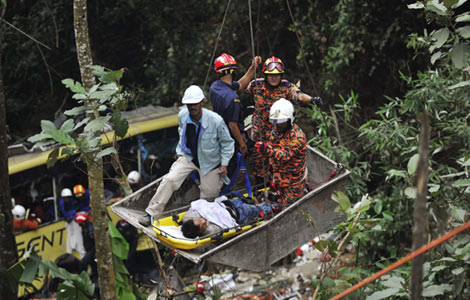
 At least 37 killed in Malaysian bus crash
At least 37 killed in Malaysian bus crash
 FM calls for closer Cambodia relations
FM calls for closer Cambodia relations Problems for rural kids in cities
Problems for rural kids in cities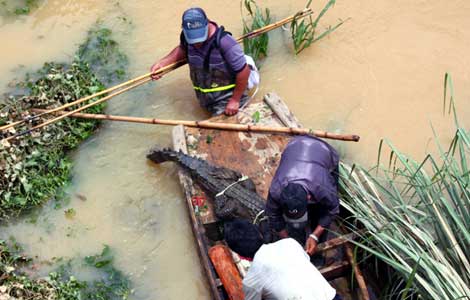
 Search for escaped crocodiles continues
Search for escaped crocodiles continues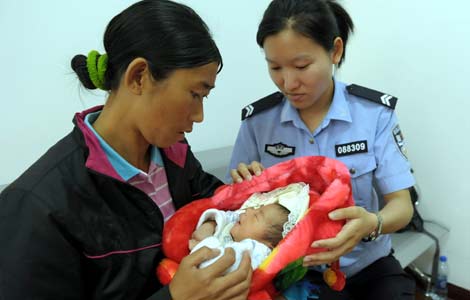
 Police break up baby trafficking ring
Police break up baby trafficking ring
 Jeremy Lin celebrates birthday in basketball clinic
Jeremy Lin celebrates birthday in basketball clinic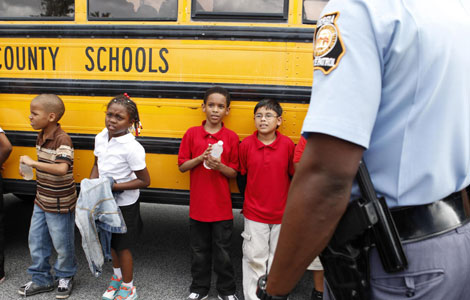
 Police identify suspect in US school shooting
Police identify suspect in US school shooting
Most Viewed
Editor's Picks

|

|

|

|

|

|
Today's Top News
Bo Xilai stands trial for bribery, embezzlement
Affluent tourists 'go it alone'; seek culture, good food
Sales of iPad fall as Android-based devices gain
Manning gets 35 years in WikiLeaks trial
Chinese workers detained in Russia
US spying raises tensions with China
Wildlife plan struck with Kenya
Egypt court orders Mubarak's release
US Weekly

|

|
